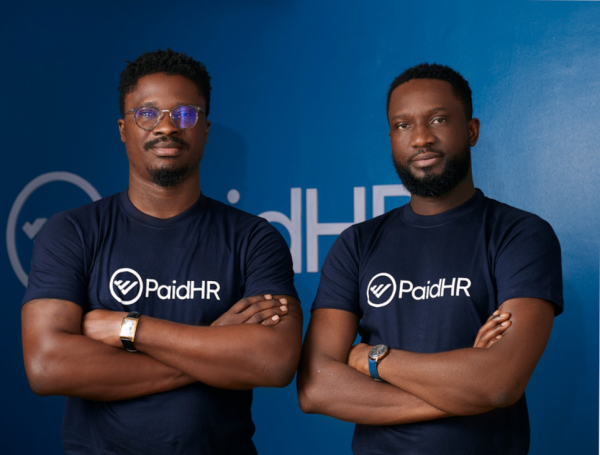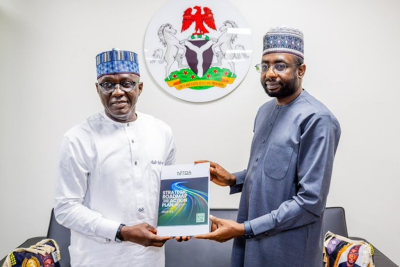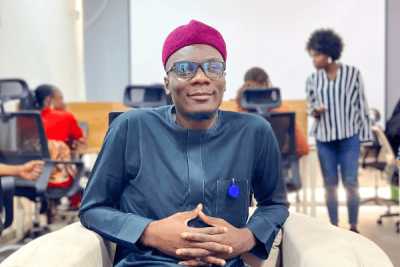Nigerian HR-tech startup PaidHR has raised $1.8 million in seed funding to deepen its mission of simplifying payroll and workforce management for African businesses. The round, announced June 23, was led by Accion Venture Lab, with participation from returning investors Zrosk, Chui Ventures, and Zedcrest Capital.
The new capital follows a $500,000 pre-seed round in 2022. It will be used to accelerate product development, grow the team, scale across Africa, and expand offerings in compliance automation, HR analytics, and employee financial wellness.
As African businesses increasingly digitalize operations amid economic uncertainty, PaidHR positions itself at the center of a rising need for intuitive, scalable, and inclusive workforce solutions.
The Information Technology Industry Development Agency (ITIDA), in partnership with 500 Global, has opened applications for Batch 6 of the Egypt Seed Bootcamp, scheduled to run from September 27 to October 1, 2025.
The five-day immersive program is tailored for Egypt-based pre-seed and seed-stage startups, offering founders the tools and mentorship needed to gain clarity, accelerate growth, and develop actionable strategies.
Participants will benefit from one-on-one guidance from global experts and deep dives into critical startup areas, including growth hacking, branding, storytelling, fundraising, team building, and talent development. The deadline for applications is July 13.
The National Information Technology Development Agency (NITDA) and the National Commission for Refugees, Migrants and Internally Displaced Persons (NCFRMI) are expanding their partnership to improve digital access and skills for displaced Nigerians.
NITDA Director General Kashifu Inuwa and NCFRMI Federal Commissioner Aliyu Tijani Ahmed discussed scaling up digital literacy, ICT tool deployment, and tailored training for displaced persons and vulnerable youth.
The renewed collaboration, announced June 19, also includes capacity building for NCFRMI staff. The goal is to equip displaced communities with the digital tools needed to access education, start businesses, and integrate into the digital economy.
This pilot marks a significant milestone in the ambition to integrate Africa’s financial systems, encourage formal trade, and make cross-border commerce more inclusive for businesses and individuals alike.
Onafriq, in collaboration with the Pan-African Payment and Settlement System (PAPSS) – the financial market infrastructure project led by Afreximbank and the African Union under the AfCFTA framework- has launched a pilot cross-border payment service in Ghana aimed at streamlining payments for both SMEs and individuals across Africa.
The six-month pilot, announced on June 20, has been approved by the Bank of Ghana (BoG). It allows banks, licensed fintechs, mobile-money providers, and traditional partners working with Onafriq to enable real-time transfers directly into recipients' mobile wallets and bank accounts via PAPSS’s secure infrastructure.
Onafriq CEO Dare Okoudjou emphasized that the service enhances convenience and strengthens economic links between Ghana and partner African markets. “African borders are starting to matter less; this is Onafriq's goal,” he remarked.
Echoing his sentiment, PAPSS CEO Mike Ogbalu III noted that simplifying cross-border payments eases financial burdens on SMEs and supports regional financial inclusion.
The initiative is a practical extension of the 2022 partnership between Onafriq and PAPSS. It targets long-standing challenges around expensive transaction fees, unclear exchange rates, and the informal nature of much intra-African trade. Through this solution, smaller operators can leverage PAPSS’s framework and regulatory protections while benefiting from settlement through Afreximbank, ensuring reliable, timely cross-border transactions.
The pilot phase will assess transaction volumes, user adoption, and foreign exchange dynamics, while delivering better rates and transparency to users. As part of the rollout, the service will soon be available on various mobile money and fintech wallets across participating markets.
Payment systems across Africa, including mobile money platforms, are primarily designed for domestic use and often lack interoperability, making it difficult to transfer funds across borders. This fragmentation presents a major barrier to unlocking the potential of intra-African commerce, particularly for SMEs and digital entrepreneurs who depend on fast, affordable, and seamless transactions to compete and grow in an increasingly connected marketplace.
By enabling seamless, low-cost, and secure transactions across national payment systems, initiatives like the Onafriq-PAPSS pilot can help bridge this gap, reduce reliance on costly foreign intermediaries, and unlock billions in untapped trade potential under the African Continental Free Trade Area (AfCFTA).
Hikmatu Bilali
Sources
Onafriq | Onafriq Partners with PAPSS to Launch Cross-Border Payment Services in Ghana | Onafriq
Abdulkadir Suleiman Lapai builds and leads several tech companies in Nigeria. He creates digital tools that improve how schools and healthcare centers operate, always focusing on local needs.
A Nigerian software engineer and entrepreneur, Lapai plays a key role in growing his country’s tech sector. He leads Tespire, a company he founded to expand digital access in education and healthcare.
Lapai and Umar Madugu started Tespire in 2022. The company equips private Nigerian schools with internet, tablets, and management software. Tespire aims to modernize education and cut financial losses caused by poor tuition fee management. Its platform speeds up payment collection, improves communication between schools and parents, and boosts administrative transparency.
Tespire says it has generated over $12 million in revenue for partner schools and improved their administrative efficiency by 80%. In May 2025, Alternative Bank funded Tespire’s new health research program, Asibiti. Asibiti builds tools for hospital management and medical data handling. Its first product, the Asibiti box, connects patient data in one place and helps track care. Hospitals in Niger State tested it, and the company plans to expand to private clinics.
Lapai also founded JD Lab, a tech firm that supports projects solving Africa’s unique challenges with emerging technologies. He co-founded Labspace Nigeria, an innovation hub offering shared workspaces and backing sustainable growth projects.
He consults for Nigeria’s Ministry of Science and Technology and leads the IT team for TEDxMinna, a platform for spreading fresh ideas.
Lapai earned a bachelor’s degree in computer science from Ibrahim Badamasi Babangida University in 2011. He completed a master’s in finance and investment at Ahmadu Bello University in 2019. He started his career in 2012 as a research assistant at the Federal Agency for Science & Technology.
From 2014 to 2016, he worked as a software engineer. In 2017, he became special assistant to the governor of Niger State. There, he oversaw the development of a management system for the State’s Career Information and Resource Center (NSCIRC).
Melchior Koba
Kodjo Aïd Otou builds tools to meet the construction sector’s needs. He splits his time between running businesses and creating digital solutions.
Otou, a civil engineer and Togolese entrepreneur, leads Edole Africa as CEO. He founded the company to simplify construction work through technology.
Since its launch in December 2020, Edole Africa has developed a digital platform for the building and public works sector. The platform offers a database of skilled labor, rental equipment, expertise, and technical support. Based in Lomé, Edole Africa expanded to Ivory Coast in February 2024. It operates a marketplace that connects users with skills and equipment.
“Thanks to our website and app, Edole Africa lets anyone access hundreds of rental providers across Togo with a single click, saving valuable time,” Otou said in 2023. “Our platform aggregates offers from carefully selected companies and independent renters, guaranteeing 98% availability and all types of equipment. We free customers from the hassles of traditional rentals.”
The company negotiates and compares prices before listing offers. Users can book, manage, and track orders from one platform.
Otou also runs Archange Constructions, which he founded in 2018. He graduated from FORMATEC University with a civil engineering degree in 2012. He holds a business strategy certificate from HEC Paris and earned the rank of Officer of the Order of Social Merit.
He started his career in 2014 as a site manager at Société des Études et Exécution des Bâtiments et Travaux Publics (EEBTP), working there until 2016.
Melchior Koba
Before launching his own ventures, he built his career helping companies design and implement data and AI platforms, working with firms specialized in big data and data science. He also serves on the boards of several companies.
Soulaimane Lahrech (pictured) is a Moroccan entrepreneur who specializes in artificial intelligence and data management. He is the CEO of Talaty, a fintech company that builds digital tools to help small and medium-sized enterprises (SMEs) secure financing across Morocco and Francophone Africa.
Founded in 2022, Talaty has created an instant credit platform powered by advanced AI technologies, including computer vision, text analysis, and behavioral finance tools. This system helps financial institutions speed up loan approvals, lower operating costs, and reduce default risks, all while opening up credit access to businesses traditionally excluded from the banking system.
What sets Talaty apart is how easily its platform connects to the existing systems used by banks and other financial providers. Thanks to AI, the platform delivers faster, fairer risk assessments, helping entrepreneurs access financing with fewer hurdles. The broader goal is to boost local economic growth by making funding more accessible for businesses.
In addition to his work at Talaty, Lahrech is a founding partner and operations director at AIOX Labs, a company focused on building businesses across Africa and Europe. He is also a partner at 34 Ventures, an investment firm, and sits on the boards of several AI and data companies, including Deepecho, ToumAI, and Akumen IA.
Lahrech graduated from ESSEC Business School in France in 2013 with a master’s degree in management and business administration. In 2015, he earned a degree in tech entrepreneurship and computer science from the University of California in the United States.
His professional journey started in 2011 with ESSEC Conseil International. By 2012, he was working as a data and digital strategy consultant at Capgemini Invent, the innovation and transformation arm of Capgemini Group. Between 2017 and 2018, he served as a project lead at Equancy, a French consulting firm specializing in digital strategy and data management.
Melchior Koba
These engagements mark a significant step in Egypt’s efforts to position itself as a regional leader in digital services, deepen international cooperation, and create new job opportunities for its youth in the global tech economy.
Egypt’s Minister of Communications and Information Technology, Dr. Amr Talaat, met with top Italian industry leaders and business representatives in Rome to deepen cooperation in the ICT sector and promote Egypt as a global offshoring hub, the Ministry of Communications and Information Technology announced June 19. The meetings were part of a broader push to attract foreign investment and expand bilateral partnerships in digital transformation and innovation.
Dr. Talaat met with Enrico Bagnasco, CEO of Sparkle and President of Confindustria Assafrica & Mediterraneo, alongside Egypt’s Ambassador to Italy, Bassam Rady. Discussions focused on fostering partnerships between Egyptian and Italian ICT companies, with a spotlight on expanding cooperation in digital capacity building through linkages between Sparkle Academies and Egypt’s WE Applied Technology Schools.
The Minister also reviewed the achievements of the ongoing partnership between Telecom Egypt and Sparkle, particularly in enhancing international digital infrastructure. He outlined Egypt’s Digital Egypt Strategy for the Offshoring Industry, emphasizing the country’s strategic advantages, including a skilled multilingual workforce, advanced infrastructure, and competitive incentive packages for investors.
In a separate meeting, Dr. Talaat met with Alfonso Siano, Head of International Relations at Intesa Sanpaolo, Italy’s leading banking group. Discussions centered on expanding the bank’s operations in Egypt and exploring collaborations in FinTech innovation. The Minister highlighted Egypt’s fast-growing offshoring sector, particularly in banking and financial services, and its ability to support global operations with digitally skilled youth and cutting-edge digital infrastructure.
Further discussions were held with Gianfranco Previtera, President of AlmavivA, one of Italy’s largest tech companies, and Amr Sayed, Business Development Manager for MENA. AlmavivA shared plans to scale its Egypt office and grow its workforce to meet rising demand for offshoring services, leveraging Egypt’s talent pool and cost-effective business environment.
This push to deepen Egypt–Italy digital cooperation directly supports Egypt’s broader ambitions to become a global hub for IT offshoring, digital services, and innovation-driven investment. Egypt’s Digital Egypt Strategy for the Offshoring Industry, launched by the Ministry of Communications and Information Technology (MCIT), aims to attract $9 billion in digital exports annually by 2026.
Hikmatu Bilali
Highlights:
- Liquify converts unpaid invoices into near-instant working capital for SMEs
- The Ghanaian fintech offers funding in 24 to 48 hours via an online platform
- The startup plans to expand across Africa with new financial partnerships
Liquify, a fintech solution developed by a young Ghanaian startup, is making it easier for small and medium-sized businesses to unlock cash from unpaid invoices.
The company was founded in 2023 by Nadya Yaremenko and Alberta Asafo-Asamoah. Its platform lets businesses convert outstanding customer invoices into quick cash, helping improve cash flow without waiting weeks for payments.
“We unlock cash trapped in their unpaid invoices: exporters upload an invoice, our platform runs KYC/AML and credit checks, and the invoices get funded within hours, not weeks, at a fraction of the cost,” explained co-founder Nadya Yaremenko.
Liquify uses its own technology to analyze risk and verify cross-border payments, making the process fast and secure. There is no mobile app involved. Businesses submit invoices through the online platform and can receive funding within 24 to 48 hours.
The startup has already supported several hundred SMEs in Ghana and Kenya and has big plans to expand across Africa. To grow its model, Liquify is looking to build partnerships with banks and export promotion agencies.
In the medium term, the company aims to add foreign exchange hedging and credit scoring tools to its platform. The goal is to create a one-stop shop for B2B financing in African markets.
“We give global investors access to a new untapped asset class. Each invoice is a short-term, self-liquidating note showing almost zero correlation with public markets. We do it end-to-end and paper-free. From onboarding to settlement, everything happens on our digital platform, no couriers, no spreadsheets, no guesswork,” added Yaremenko.
Adoni Conrad Quenum
Key highlights:
- The DRC will roll out SISAG, a real-time digital monitoring platform for government projects, in Q3 2025.
- The system will centralize data, track delays, and connect ministries for improved coordination and transparency.
- Inspired by African peers like Rwanda and Benin, the platform is a core part of the country’s 2024–2028 Government Action Program.
The Democratic Republic of Congo (DRC) plans to launch a new digital platform called SISAG in the third quarter of 2025 to improve monitoring and transparency of government projects.
SISAG, an Information System for Monitoring Government Actions, will centralize data on priority projects and update progress in real time. The system will feature dashboards for live tracking, automatic alerts for delays, and data sharing across ministries.
The platform will connect with key institutions including the National Institute of Statistics, the National Secretariat for Capacity Building, and the Agency for Digital Development to ensure reliable data flow.
A dedicated technical unit, USAG, will coordinate ministries, compile data, and provide objective analysis to support decision-making and accountability.
A Core Part of the 2024–2028 Government Action Program
SISAG fits into the Government Action Program (PAG) for 2024–2028, recently adopted by Congo’s leaders. The PAG demands clear indicators, measurable goals, and results-driven public action.
SISAG aligns political goals with technology. It tracks commitments closely and enables ongoing evaluation. The system will speed up public investments, enhance coordination between ministries, and increase transparency in managing resources.
Learning from Africa’s Best Practices
DRC models SISAG on successful tools used in other African countries. Rwanda uses Imihigo, a performance system based on annual contracts. Benin relies on MPAT to assess ministry performance. These tools have proven they can boost accountability and energize government action.
Once fully up and running, DRC plans to expand SISAG to provincial governments. This will allow detailed monitoring of local projects. Eventually, DRC may open parts of SISAG’s data to the public to build citizen trust. But this will require firm political backing, careful rollout, and strong buy-in from all stakeholders.
This article was initially published in French by Samira Njoya
Edited in English by Ange Jason Quenum
More...
- Comoros unveils two digital platforms, E-Shiyo and E-Msomo, to expand education access and improve school governance.
- E-Shiyo offers online textbooks; E-Msomo tracks student data and automates academic reports.
- The initiative is part of the “Comoros Digital 2028” plan, with UNICEF backing and support from ANADEN.
Comoros takes a big step toward modern education by launching two digital platforms, E-Shiyo and E-Msomo. These tools aim to fix problems of access, fairness, and outdated systems in schools.
The Ministry of National Education leads this effort, with technical help from the National Agency for Digital Development (ANADEN) and funding from UNICEF. Their goal: improve education access and tighten governance.
E-Shiyo offers an online library of textbooks for pre-primary and primary students. Kids can access lessons anytime, anywhere, on any connected device.
E-Msomo digitizes school administration. It creates a centralized system for managing report cards, assigns each student a unique ID, and tracks academic results automatically. This system helps schools trace student progress, boost transparency, and support better decisions by education officials.
This push fits into the “Comoros Digital 2028” plan, which aims to grow the digital sector’s share of GDP to 5% by 2028. Across Africa, e-learning is booming. Ambient Insight projects the continent’s online learning market will top $1.5 billion by 2030.
Beyond just handing out digital books and report cards, these platforms improve governance. They consolidate data to measure school performance, cut errors, and allocate resources smarter.
Next steps include boosting internet access—currently only 35.7% of Comorians are online—equipping schools with digital gear, training teachers, and protecting student data.
This article was initially published in French by Samira Njoya
Edited in English by Ange Jason Quenum
Starlink, SpaceX’s satellite internet service, is now available in Guinea-Bissau, delivering high-speed, low-latency connectivity to the country, it announced June 18.
This rollout marks Starlink’s entry into its 20th African market. The improved connectivity is expected to benefit key sectors like education, healthcare, agriculture, and enable more remote work and digital services.
While costs may still limit widespread adoption, Starlink’s arrival represents a major step toward closing Guinea-Bissau’s digital divide and expanding internet access across the country.
Key Highlights:
- Belaroui Belkacem, a trained bioinformatician, founded K-ZONE, an e-commerce platform endorsed by Algeria’s Ministry of Knowledge Economy.
- Launched in 2020, K-ZONE offers both international brands and locally made products to Algerian consumers at home and abroad.
- Belkacem also leads a life sciences club at Oran 1 University and has held roles at Sonatrach and the Mediterranean Games Committee.
Belaroui Belkacem, a bioinformatician from Algeria, has pivoted from science to entrepreneurship, launching an e-commerce venture that connects Algerians with both local and global products.
Belkacem founded K-ZONE in 2020, a digital marketplace that sells items tailored for everyday use—ranging from children’s products to fashion and home essentials. The platform is officially recognized by Algeria’s Ministry of Knowledge Economy, Startups, and Micro-Enterprises.
K-ZONE aims to simplify the lives of Algerians, whether they live in the country or abroad, while spotlighting locally made goods. The company says it carefully selects suppliers, focusing on product quality, authenticity, and craftsmanship.
In addition to his role as a tech entrepreneur, Belkacem remains active in the academic sphere. He currently chairs Biologêêk Pr Boutiba Zitouni, a scientific and cultural club attached to Oran 1 Ahmed Ben Bella University. The club focuses on biology and life sciences and promotes student-led innovation.
His previous professional experiences include a 2021 internship with Sonatrach, Algeria’s state oil and gas company, and serving in 2022 as a quality control supervisor for food safety during the Mediterranean Games hosted by Algeria.
Belkacem represents a growing class of young North African innovators merging scientific expertise with tech-driven entrepreneurship to build new ecosystems of value.
This article was initially published in French by Melchior Koba
Edited in English by Ola Schad Akinocho
While digital transformation is globally acknowledged as a catalyst for sustainable development, Africa still lags in foundational digital infrastructure and skills. This initiative reflects a broader push to harness digital technology for the advancement of the continent.
The United Nations Development Programme (UNDP) and the China Academy of Information and Communications Technology (CAICT), a research institute and think tank in China, have signed a Memorandum of Understanding (MoU) to co-develop the Africa Digital Empowerment and Innovation Hub. This initiative, signed June 16, aims to accelerate digital transformation in Africa.
The agreement was formalized on the sidelines of the 4th China-Africa Economic and Trade Expo, highlighting a shared vision to leverage technology for long-term development impact.
“This partnership with CAICT is a bold step toward realizing Africa’s digital future. By combining UNDP’s development expertise with CAICT’s technological leadership, we are laying the foundation for people-centered digital transformation aligned with the Sustainable Development Goals,” said Ahunna Eziakonwa, Assistant UN Secretary General and Director of the UNDP Regional Bureau for Africa.
The Hub will serve as a collaborative platform for co-creating open-source digital solutions, strengthening institutional and human capacities, and fostering South-South cooperation. It aims to modernize Africa’s digital infrastructure by leveraging digital public goods, local innovations, and emerging technologies.
CAICT Vice President Li Guanyu described the agreement as a milestone in efforts to advance inclusive digital innovation, stating, “We are excited to partner with UNDP to drive digital progress in Africa. This MoU marks a significant milestone in our efforts to leverage technology for inclusive growth and development.”
The Hub will prioritize training programs for youth, women, and government actors in areas including artificial intelligence, cloud computing, cybersecurity, and digital governance. It will also support the development of Digital Public Infrastructure (DPI), empowering startups and entrepreneurs to scale high-impact solutions across health, education, agriculture, and green energy sectors.
In addition to skill-building, the platform will promote cross-border collaboration between African and Chinese enterprises through innovation accelerators, mentorship schemes, and investment dialogues, reinforcing economic ties while championing inclusive innovation.
The World Bank estimates that over 230 million jobs in sub-Saharan Africa will require digital skills by 2030, yet current education and training systems fall short of meeting this demand. This growing demand for digital skills underscores an urgent need to reform and expand Africa’s digital education and training systems. Without timely intervention, millions of young Africans risk being excluded from the future workforce, deepening unemployment and inequality across the continent. Initiatives like the Africa Digital Empowerment and Innovation Hub are therefore critical, not just for economic competitiveness, but for ensuring that Africa’s youth are equipped to thrive in a digitally-driven global economy.
Hikmatu Bilali















